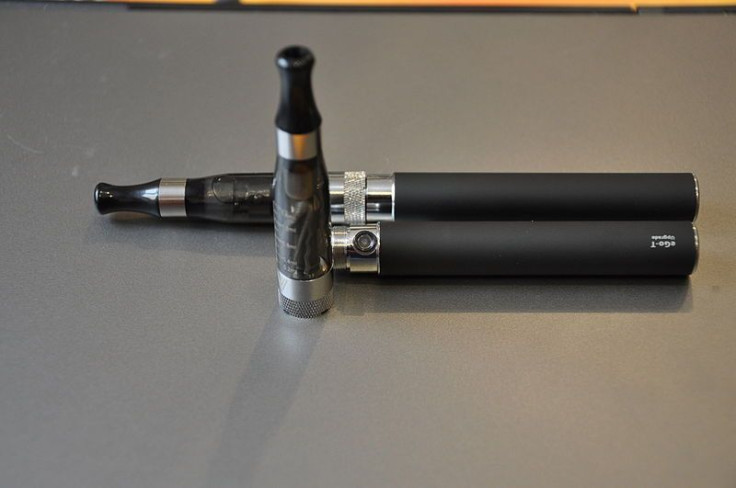E-Cigarettes Spark Debate In The UK: Are They Really Safe?

Just when smokers thought they had caught a healthy break from smoking bans by using e-cigarettes, UK health officials are debating whether regulation of the "death stick" alternatives is necessary, barely a week after France announced plans to restrict areas in which smokers could indulge in their e-cigarettes.
It's been almost six years since a public smoking ban was introduced across the UK. Although efforts to curb smoking through nicotine-replacement products and bans in certain areas have been successful, many people are still addicted to smoking. As many as 114,000 people die each year at an estimated cost of £2.7 billion to the National Health Service (NHS), according to The Guardian. Now, with as many as one million smokers across the UK having tried e-cigarettes, health care officials are wondering just how safe they really are.
Some critics argue that the health benefits of e-cigarettes over traditional cigarettes may be overstated. Worse yet, they might act as a gateway to actual cigarette smoking, especially if marketed to teenagers and children. In the UK, there are currently no bans on e-cigarettes, making them available even to children.
"Any product that could potentially glamorize smoking is not welcome here," David Hill, a head teacher at Burton Borough School in Newport, Shropshire, told Sky News.
The British Medical Association (BMA) has voiced concern over a lack of rigorous, peer-reviewed studies that support the claim that e-cigarettes are a safe and effective form of nicotine-replacement therapy, just like gum or patches. The organization seeks regulation of e-cigarettes, including a ban on them in public spaces.
"These devices directly undermine the effects and intentions of existing legislation including the ban on smoking in enclosed spaces," Richard Jarvis, co-chair of the BMA's public health medicine committee, said.
But when it comes to hard facts on their safety, Vivienne Nathanson, the BMA's director of professional activities admitted, "The simple answer is we don't know."
E-cigarettes are battery powered devices that look like cigarettes. They heat nicotine in disposable cartridges in order to produce a vapor that the smoker inhales. They come in different flavors as well as various nicotine levels, and the manufacturers claim that the vapor exhaled from the person's mouth isn't harmful to anyone else who may be around. They are also supposed to be a safe alternative because they only contain nicotine and none of the other harmful chemicals found in cigarettes.
Other professionals disagree with the BMA's stance.
"We have such a massive opportunity here," Robert West, director of tobacco studies at the University College London, told The Guardian. "It would be a shame to let it slip away by being overly cautious. E-cigarettes are about as safe as you can get."
"Nicotine is not what kills you when you smoke tobacco," he continued. "E-cigarettes are probably about as safe as drinking coffee. All they contain is water vapor, nicotine, and propylene glycol," which is used to help vaporize the liquid nicotine.
On Wednesday, the National Institute for Health and Care Excellence (NICE) will publish guidance on "new approaches to help reduce the harm from smoking tobacco." Many people expect the subject of e-cigarettes to appear in it.
"We could see the end of tobacco use in the UK within five to 10 years if e-cigarettes are allowed to flourish," West said. "Why would smokers continue to kill themselves if they could use e-cigarettes? Smoking is so last century."
It's not only in the UK that e-cigarettes are expected to flourish either. Wells Fargo securities has reported many times that the e-cigarette market will overtake traditional cigarettes within a decade, according to Forbes. With the rate of cigarette smoking declining, American tobacco companies have also invested in e-cigarettes — most recently Altria, the parent company of Philip Morris USA.
In a move to treat e-cigarettes like traditional ones, the California Senate voted in May to ban them from inside public buildings, near playgrounds, inside restaurants, and on airplanes. The bill, known as Senate Bill 648, would also restrict the places where e-cigarette companies could advertise, according to The Sacramento Bee.
The bill was passed by a 21-10 vote. One of the lawmakers who voted against it, Sen. Joel Anderson, R-Alpine, believes that they are an effective way to quit regular cigarettes. He urged senators to consider that, especially when California spends "tens of millions, billions of dollars trying to get people off cigarettes."
The subject of e-cigarette restrictions has barely been touched in the United States. In 2010, the Food and Drug Administration (FDA) issued warning letters to manufacturers citing "violations of good manufacturing practices, making unsubstantiated drug claims, and using the devices as delivery mechanisms for active pharmaceutical ingredients."
They also mentioned, however, that the effects of e-cigarettes are unclear, and included a phone number for people to report any adverse events.



























